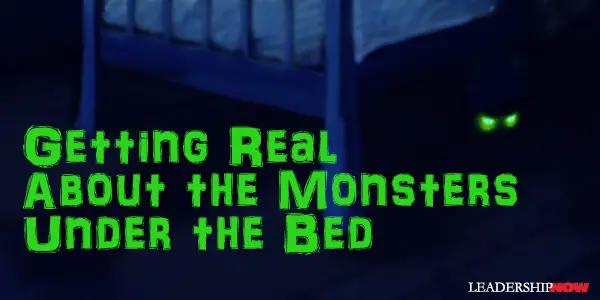 |
 |
08.29.18

Getting Real About the Monsters Under the Bed
Some windows are lighted. But mostly they're darked. I once had a conversation with a neighbor who admitted, matter-of-factly, that she really doesn’t like change. This preference shapes her decisions, and her life, in countless ways. Now, I can intellectualize a desire to hold on to the status quo. But I don’t really get it. No matter how good things are, our lives can always be better. So why not strive for more: in our work, our relationships, our families, our communities? Not to be greedy, but to live life to its fullest, and to make our world a little better. Ultimately, I suspect the fear of change is really a fear of uncertainty. A nagging sense that the benefits of change might not justify the potential risks. Shakespeare describes this human condition well, as he so often does: “Our doubts are traitors/And make us lose the good we oft might win/By fearing to attempt.” [Measure for Measure, I:4]
The political discourse of late has become fixated on certainty, and it’s discouraging. “The problem is with the Mexicans, or the Muslims, or the banks, or the police, or the pharmaceutical companies.” We know in our hearts that simple, certain solutions are both incomplete and intellectually dishonest: “If we make these changes, then the monsters won’t hide under the [proverbial] bed.” Certainty may get votes, but it isn’t leadership. We aren’t children. Where is the courage—on either side of the political aisle—to admit that the world is complex? That we rarely understand the relationship between cause and effect? Klaus Schwab of the World Economic Forum wrote an excellent book, The Fourth Industrial Revolution, which should be required reading for all business and political leaders. Not because it paints a clear picture of the future. Rather, because it so clearly describes an amazing, uncertain future, full of both opportunity and peril. And because it raises critical questions that aren’t getting nearly enough attention—in the halls of Congress or the conference rooms of corporate America. As Schwab argued: “The fourth industrial revolution is not only changing what we do but also who we are. The impact it will have on us as individuals is manifold, affecting our identity and its many related facets – our sense of privacy, our notions of ownership, our consumption patterns, the time we devote to work and leisure, how we develop our careers, cultivate our skills. It will influence how we meet people and nurture relationships, the hierarchies upon which we depend, our health, and maybe sooner than we think, it could lead to forms of human augmentation that cause us to question the very nature of human existence. Such changes elicit excitement and fear as we move at unprecedented speed.” Surely, we all need to get more comfortable with ambiguity. We can scarcely understand the present, and we have yet to invent a crystal ball that sees into the future. Change is scary, but so is standing still. As Bono sang in U2’s (underrated) song, Summer Rain: “When you stop taking chances you'll stay where you sit/You won't live any longer but it'll feel like it.” I have bad news for my neighbor. Change is not just coming; it’s already here. And it’s going to accelerate. More than ever, corporate and political leaders need to get real. They need to acknowledge complexity, work together to confront difficult questions, and offer an honest, thoughtful assessment of risks and opportunities as they chart a path into an uncertain future. 
Posted by Michael McKinney at 07:30 AM
|
BUILD YOUR KNOWLEDGE
 

How to Do Your Start-Up Right STRAIGHT TALK FOR START-UPS 
Grow Your Leadership Skills NEW AND UPCOMING LEADERSHIP BOOKS 
Leadership Minute BITE-SIZE CONCEPTS YOU CAN CHEW ON 
Classic Leadership Books BOOKS TO READ BEFORE YOU LEAD |